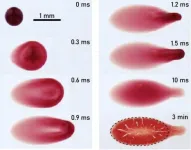The deep sea is home to one of the world's largest communities of animals about which we still know very little. Yet it is already subject to a growing number of human-induced environmental pressures. How do its inhabitants respond to these stressors? A new study led by researchers from the GEOMAR Helmholtz Centre for Ocean Research Kiel, published today in the scientific journal Nature Communications, provides first insights into the stress response of a deep pelagic jellyfish to ocean warming and deep-sea mining induced sediment plumes.
One particular and potentially large environmental stressor for organisms in the deep ocean is the environmental disturbance associated with the commercial mining of mineral resources on the seafloor. Although mining operations will target seafloor minerals, they will also disturb and pump up fine sediment off the seafloor, generating suspended sediment ‘clouds’ (known as plumes) along the seafloor. Once on the ship, the collected sediment will need to be discharged back into the water column. Since there are currently no regulations at what water depth the sediment should be released, the sediment plumes that are generated like this can extend for tens to hundreds of kilometers throughout the water column. Deep-sea mining would therefore not only affect animal communities on the seafloor, but also those in the overlying water column, known as midwater. Since there is usually little sediment in the midwater, it is expected that midwater animals will be highly sensitive to mining induced sediment plumes.
This is concerning as Dr Helena Hauss, co-first author of the study and Research Director Marine Ecology at Norwegian Research Centre (NORCE), explains: “The midwater is crucial for the global ocean’s capacity to store carbon, but also its inhabitants are the main food source for many fish, squid, and marine mammal species and therefore resemble a critical link in the marine food web. They have evolved under much more stable conditions compared to surface dwelling animals, under a constant scarcity of food, and are therefore potentially more susceptible to changing conditions in their environment.” Dr Henk-Jan Hoving, senior author and group leader of the Deep Sea Ecology group at GEOMAR, adds: “Midwater species are often fragile, gelatinous and sometimes giant organisms, with low metabolic rates that are difficult to observe in their natural environment and to perform experiments on. Their physical fragility may make them particularly vulnerable to environmental disturbance. At the same we have only scratched the surface when it comes to exploring the midwater and most biodiversity still remains unknown, as well as their function in the ecosystem, and their tolerance to change.”
Despite the importance of midwater ecosystems on a global scale, little research has so far focussed on species-specific responses of midwater animals to environmental stressors. This is the gap that the researchers set out to fill in the recently published study. For the first time, the authors of the study investigated the stress response of a midwater organism, the helmet jellyfish (owing to its hat-like shape) to simulated sediment plumes. “Since determining ‘stress’ in a jellyfish is not a straightforward process, we investigated their response from multiple angles and combined insights gained from their physiology, gene expression and the microbial symbionts on the jellyfish’s exterior”, explains Vanessa Stenvers, co-first author of the study and doctoral candidate at GEOMAR and the Smithsonian Institution. The strongest visual effect of suspended sediment was the aggregation of sediment particles on the jellyfish after just ~1.5 hours of incubation, to which the jellyfish started to produce excess mucus that slowly sloughed off. “While mucus helped jellyfish maintain a stable microbiome, continuous mucus production is an energetically costly response and can demand a substantial portion of the total energy budget of an animal”, adds Stenvers.
Additionally, jellyfish showed marked expression of genes related to respiration, innate immunity and wound repair in the highest sediment treatments, further signaling stress. Whether jellyfish can recover after exposure remains subject of further research, as a comprehensive understanding of ecosystem responses to stressors will take time. The team further emphasizes that suspended sediment induced a more severe response in helmet jellyfish than a four degrees-rise in sea water temperature. Current climate projections assume that sea temperatures will rise by one degree in the next 84 years, while a rise of four degrees is only predicted in the most extreme global warming scenarios. The authors are concerned that stressors leading to increased energy expenditure, as they observed for the helmet jellyfish, will have to be met with increased food intake. Since food in the deep sea is generally scarce, this could ultimately lead to starvation.
Although more data from different midwater species are needed to better understand the environmental impacts of deep-sea mining, the stress response in helmet jellyfish may be representative of other gelatinous animals. Gelatinous animals, characterized by a high water content and jelly-like tissues, are an abundant component of deep-sea ecosystems, represented across the tree of life. Based on their overall findings, the researchers urge caution with regard to deep-sea mining, as many of the deep ocean’s important ecosystem services could be compromised.
Professor Andrew K. Sweetman, co-author from the Scottish Association for Marine Science, concludes “With deep-sea mining possibly starting in the next decade, which has the potential to disturb nearby water column habitats as well as the seafloor, understanding the combined effects of mining and ocean warming is essential.” The team hopes that their study, which provides a first glimpse into what some of the possible impacts may be in the midwater zone, will be taken into account by mining companies and the International Seabed Authority (ISA) to develop mining strategies that reduce the environmental damage as much as possible.
Background:
This research was carried out as part of the iAtlantic (Integrated Assessment of Atlantic Marine Ecosystems in Space and Time) project. iAtlantic is a multidisciplinary research programme seeking to assess the health of deep-sea and open-ocean ecosystems across the full span of the Atlantic Ocean. It aims to deliver knowledge that is critical for responsible and sustainable management of Atlantic Ocean resources in an era of unprecedented global change. iAtlantic is undertaking an ocean-wide approach to understanding the factors that control the distribution, stability, and vulnerability of deep-sea ecosystems - including impacts arising from human activities. Work spans the full scale of the Atlantic basin, from the tip of Argentina in the south to Iceland in the north, and from the east coasts of USA and Brazil to the western margins of Europe and Africa. Central to iAtlantic’s success is the international collaboration between researchers throughout the Atlantic region, with the project consortium comprising 33 research institutions from Europe, Argentina, Brazil, South Africa, Canada and the USA, and complemented by a wider network of associated partners.
Project funding:
The Integrated Assessment of Atlantic Marine Ecosystems in Space and Time (iAtlantic) project is funded by the European Union's Horizon 2020 programme, under grant agreement 818123. The project started on 1 June 2019 and finishes on 31 March 2024.
END



